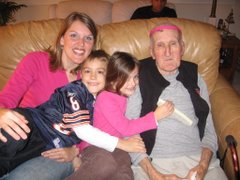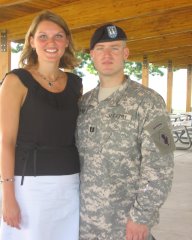I Had Seen Castles
By: Cynthia Rylant
I appreciated Cynthia Rylant’s historical fiction novel I Had Seen Castles. I thought it captured the many different faces of World War II - the over anxious green soldier, the sacrificing father, the supportive yet terribly worried mother, as well as the outspoken anti-war character of Ginny. I know many authors accomplish the task of bringing the perspectives of history through the life of characters, but I thought Rylant’s historical fiction text was superb! I am not a history buff, nor is historical fiction my favorite genre, but Rylant impressed and inspired me to give historical fiction another look as I browse book genres.
I have to admit, when I first picked up the book, I was surprised to learn that Rylant chose to write a historical fiction story on WWII. In our experiences with Rylant this semester, I had the feeling that her stories revolved around the family, home, as well as her Appalachian background. But, as I read the book, I realized her themes are still present… each character of the family supported the war in a different manner, exhibiting the patriotism in WWII. Furthermore, in Rylant’s interview at the end book, I read that Rylant based her story I Had Seen Castles from a WWII veteran interview she herself had read in a newspaper – an interview she was moved by and thought should be told. I commend Rylant’s motivation to tell such a story, and in my opinion to step a outside of the picture book work I am familiar with, to tell a story that captured the faces and emotions of war.
I took John’s character to heart throughout the text. My heart ached with him as he longed to turn 18, to enlist in the army, and honorably serve our country. Of course, my personal life helped me to connect to the feelings and emotions wrapped around John’s character. Aaron (my boyfriend) just returned home from a 6 month deployment in Iraq. In August, I remember trying to say goodbye, and just crying. I couldn’t fathom the affects warfare would have on him, and feared what road lie ahead for him in the desert. I remember not knowing what to say as I hugged him goodbye, and just crying even when I promised myself and him I was strong. It is for this reason I can only imagine how comforting and inspiring Ginny’s words were “you (John) will be an old man.” We all know what it feels like to have someone believe in us, can you imagine how profound this phrase was for a young man heading to war? “I (John) would regard them as sacred prophecy, and later, later, when my own weak heart could not gather enough will to live, when I felt at times I would surely die and even wished to die, I would remember that Ginny had said I would one day be an old man. And I lived for her” (pg 52). WOW! That is too sweet! As an outsider, I was so relived to know that even though Ginny did not support the war, her powerful words influenced him, giving him the courage and strength to persevere during war. In the same regard, however, I had a difficult time understanding why John did not go to Smithfield to find Ginny after he returned from war. On page 94, John proclaims that he wanted to proclaim his gratitude to her, how their experiences graciously pulled him through the war… but yet he never wanted to find her??? In the text, it reports that John was too weak and didn’t have enough resolve. Even if Ginny and John did not work out as couple, I still wished he would have found her in Smithfield and thanked her for the love and support she provided him. I wonder if anyone else wishes John would have gone to Smithfield to find her, or I am just a hopeless romantic?
Nonetheless, I am pleased I broadened my genre horizon and read Cynthia Rylant’s historical fiction, for her work continues to be nothing less than impressive!
Thursday, April 12, 2007
Subscribe to:
Post Comments (Atom)


3 comments:
I was also surprised that Rylant chose to write a novel on WWII at first. But, like you said, once you get into the book, you realize it is a lot like her other books - it is about the people, the family, the heart.
I can see how this book must have affected you a lot because of Aaron. You are a strong woman and I know you are proud of him. I have a couple friends with loved ones overseas and I see how hard it is for them. I pray for our soldiers and am so thankful for all they do. I don't think they are told that enough.
I don't think you are a hopeless romantic - I too wanted John to go back and find Ginny! I was frustrated that the book would end that way! I wanted the book to end with them at a coffee house sharing stories and embracing.
I thought Ginny's statement that John would become an old man was powerful too. I thought it was superb craft on Rylant's part. With such a simple sentence uttered by Ginny, I learned a lot about her character. As you said, she protested the war but was loving enough to see beyond her philosophical differences with John and say something that would bring him strength.
At first, I also wanted John to find Ginny. But, with more thought I decided maybe it was better that things ended when he left for the war. He held onto his untainted memories of their brief trist, and I think they probably would have been marred by further interactions. I'm sure neither of them were the same after WWII ended. I think his memory of her would have bee tainted if he had seen her. Maybe that was his true motivation for staying away and not weakness.
I am just about to read this one. It sounds more my style than Bull Run. How did this book compare to other Cynthia Rylant selections you have read?
I enjoy historical fiction when it has a good stiry line to go with it.
Post a Comment